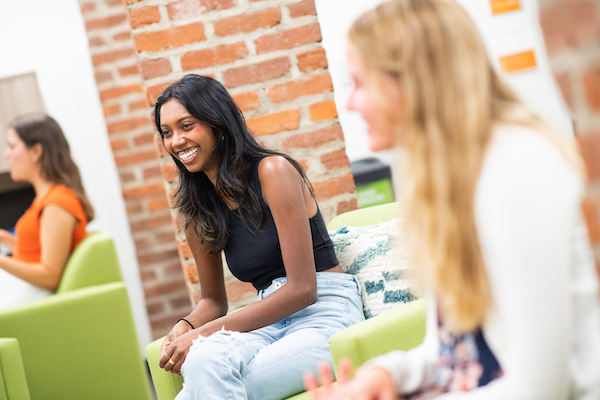
The following article from UVA Today has been re-printed with permission from the author.
In her 14 years at UVA, Kimberley Bassett has touched the lives of so many students, helping them to claim their place at the University of Virginia and welcoming them into the UVA community,” wrote Maxine Platzer Lynn Women’s Center Director Abby Palko in an email.
The center recently named Bassett as its 2021 Zintl Leadership Award recipient, citing specifically her mentoring and advising roles.
“In particular, through her work directing the Office of African-American Affairs’ Peer Advisor Program and as a Posse Foundation faculty mentor, she has changed the landscape for incoming UVA students,” Palko said. “Her support has been a crucial contribution to their academic and personal success.”
The Women’s Center established the Zintl Leadership Award in 1998 to recognize a woman working at the University whose service and accomplishments have made a significant impact on Grounds and in her profession.
Bassett joined the Office of African-American Affairs shortly after earning her Ph.D. in chemistry from UVA in 2007. She has served in various roles at the University, including instructor in chemistry and assistant dean. She became director of the Office of African-American Affairs’ nationally recognized Peer Advisor Program in 2009 and associate dean of African American affairs in 2015.
This will be a last chance to honor Bassett, who leaves this month for a new position at Johns Hopkins University as assistant dean for undergraduate academic advising in the Office of Undergraduate Academic Affairs, part of the Office of the Dean of the Whiting School of Engineering.
In a typical year of the Peer Advisor Program, Bassett would oversee four senior peer advisers and more than 70 peer advisers, who are second-year students or older. They provide first-year students with support and friendship to help them get acclimated to the Grounds.
When Bassett became director, one of her goals was to build on the University’s previous success of cultivating the highest Black graduation rate among flagship public universities. She expanded the program to provide advising in a range of academic disciplines, including STEM fields, and collaborated with her fellow deans to manage a collective strategy of enabling Black students to achieve higher GPAs so that they could compete more successfully for graduate and professional schools, as well as employment, according to her nominators.
Dr. Maurice Apprey, a professor of psychiatry who has led the Office of African-American Affairs as dean since 2007, said Bassett created pathways for students to improve academically in “an exponentially remarkable trajectory over the past 12 years.” He described her work as stellar and having high impact.
Another endorsement came from Keisha John, associate dean for diversity, equity and inclusion in the College and Graduate School of Arts & Sciences, who described Bassett as “authentic, principled, selfless, and caring,” in addition to having innovative, critical thinking and project-management skills.
Bassett “spearheaded the office’s efforts to provide comprehensive academic advising for students,” John wrote in her support letter, “beginning with the natural and health sciences and expanding to all academic disciplines. … The success of this program is a result of her close collaborations with colleagues at every level of the University’s faculty and administration.”
Kathryn Densberger, director of the Georges Student Center for advising, who nominated Bassett, described her expertise as “building stairways for our students” that lead to success.
“The collection of stairways that constitute the Peer Advisor Program are what make it so special: Every Black student who enters the University is offered a trained peer adviser. They are met at the door by a knowledgeable peer who helps them find their way. Those peer advisers are, in turn, shown by Kimberley and her team how to be more effective leaders – not only for their advisees but also for themselves – and so, year after year, one cohort of students walks with their hand on the shoulders of the next, and the sense of community and shared achievement grows.”
Students who had been senior peer advisers wrote in their letter of support that Bassett has “used her knowledge to advance the next generation of leaders.”
“Dean Bassett also always finds a way to maintain professionalism and command the attention of a room by communicating her expectations up front and holding us all accountable throughout the process,” a group of students who graduated in May wrote. “While Dean Bassett is very hands-on, which the program requires, she gives all of us the space needed to make mistakes, claim responsibility for them and find ways to avoid similar situations in the future.”
Palko noted, “As the students who wrote a letter of support attest, her presence has been transformative for their University experience. She never just provides a resource a student is seeking. She connects that student to a community, nurturing their capacity to thrive and the leadership potential of each member of the community. She has created a network …”
Palko asked to stop by to tell Bassett in person about the award, and “as she listed the nominators, my heart began to swell,” Bassett wrote in email. “There is something special about being nominated by colleagues and students whom I admire personally and professionally.”
Bassett has worked as a mentor with three cohorts of UVA Posse Scholars, including the third group made up of student veterans. The Posse Program, which UVA joined in 2013, identifies public high school students with demonstrated academic and leadership potential who may be overlooked by traditional college admission processes. Working with colleges and universities around the country, the Posse Foundation places students in multicultural teams, called “posses,” who are committed to helping one another grow and develop as they pursue their personal and academic goals.

